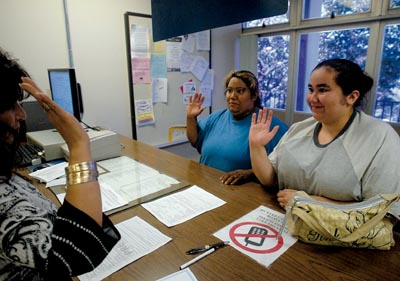
A proposed law to recognize a growing number of same-sex
marriages performed in other states and countries is winding its
way through California’s Legislature.
– McClatchy News Service
SACRAMENTO
A proposed law to recognize a growing number of same-sex marriages performed in other states and countries is winding its way through California’s Legislature.
Opponents of gay marriage say Senate Bill 54 violates Proposition 8, a voter initiative approved last November that amended the state constitution to define marriage as between a man and a woman.
The bill’s sponsor contends that his proposed changes to state family law are consistent with the California Supreme Court’s nuanced decision in May to uphold Proposition 8.
The court’s decision upheld the right of voters to bar gay couples from the label “marriage,” acknowledged SB 54’s author, Sen. Mark Leno, an openly gay Democrat from San Francisco.
But the court, Leno noted, also upheld an estimated 18,000 same-sex marriages performed in California before the gay-marriage ban was approved. Those marriages took place after the justices ruled in May 2008, in a separate decision, that California’s constitution at that time did not prevent same-sex marriage.
The high court did not address how to treat out-of-state marriages, explaining in a footnote that none of the parties involved in lawsuits represented such interests.
In that vacuum, Leno is arguing the Legislature’s role should be to clarify the rights of same-sex couples who live in California but wed elsewhere, or couples who might move or travel here in the future.
“Proposition 8 passes,” Leno said. “But there are two men who live in San Francisco who pay their taxes, work and got married legally in Massachusetts. What are they? Legal strangers? Clearly, there is a legislative need to clarify this.”
Frank Schubert, who was the campaign manager for Proposition 8, disagrees. He predicts a court battle over the law should it pass and Republican Gov. Arnold Schwarzenegger sign it.
“Our argument is that the people amended the constitution and do not approve of same-sex marriage,” he said.
There’s nothing in the court’s Proposition 8 decision, Schubert said, that should lead gay couples to think they can transfer marriage rights to California because they wed in another country or any of the six states that now allow gay marriage.
Leno’s bill would declare that any same-sex marriages performed in other jurisdictions before Proposition 8 be recognized on par with marriages that took place in California.
Same-sex couples married in other jurisdictions after Proposition 8 was approved would be afforded the same legal rights that marriage gives them here, but they could not use the word “marriage” to refer to their legal relationship.
The proposal now has sponsors in the Assembly, where on July 9 it gained approval in that house’s Judiciary Committee in a vote split along party lines _ seven Democrats for and three Republicans against.
The bill will go to the Assembly floor before the Senate hears it.
Brad Dacus, president of the conservative Pacific Legal Institute, called Leno’s bill “another cheap attempt to undermine the electoral process” and said he’d join in a lawsuit against it.
Alex Ingersoll, a resident of San Francisco, said he’d be willing to go to court as well to defend recognition of his marriage to Martin Tannenbaum.
The pair married in Massachusetts during the window of time when gays were also allowed to marry in California.
“We just assumed that our marriage would be recognized here,” said Ingersoll, 62, who manages a law firm.
They chose to marry in Massachusetts, near the Pilgrim Monument, because they wanted to be with family members on the East Coast.
Ingersoll’s roots in Massachusetts go back to 1629, he said, and Tannenbaum lived in Boston for 30 years.
“I recognize that change often comes incrementally,” Ingersoll said. If he has to go to court to defend his marriage, he said, “I’m honored to be part of it.”
(EDITORS: STORY CAN END HERE)
A same-sex couple in Sacramento with a stake in Leno’s bill got married in Canada in 2007 before gay marriage was legal in California.
John Hancock, president of the California Channel, which airs government hearings, is married to Juan Ramos, who restores historical documents for the California secretary of state’s office.
Ramos, 56, and Hancock, 55, wed in Vancouver, British Columbia, during a trip to celebrate Hancock’s recovery after a drunken driver nearly killed him.
“I had skin grafts, scars. I was broken. And to have someone want to marry you and show you that devotion, I can’t tell you what that does for you,” Hancock said. “I want to demonstrate to people that I value my commitment.”








